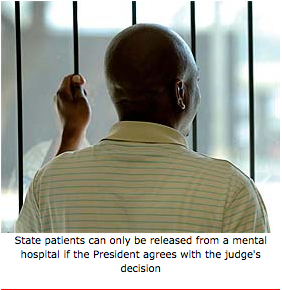STATE PATIENTS SERVING TIME IN HOSPITAL, NOT JAIL
STATE PATIENTS SERVING TIME IN HOSPITAL, NOT JAIL sadmin By law, a person who is found to be mentally ill cannot be charged for a criminal offence.
By law, a person who is found to be mentally ill cannot be charged for a criminal offence.
The Constitution and the laws of the country do not allow mentally ill people to undergo hearings in court. This is because they would not be able to understand the charges against them or the processes in court.
Murder
A number of mentally ill people in South Africa who have committed crimes have been declared state patients. It means that instead of going to jail, they go to a state mental hospital at the state's cost. This has resulted in communities wanting to take the law into their own hands because they felt that justice had not been done.
An example is the outcome of the brutal killing of three teachers by a fellow teacher at a high school in Soweto. He was arrested and faced three charges of murder. But a psychologist (a doctor who studies the human mind and behaviour) found him to be mentally disturbed. He could not be held responsible for his crimes because he didn't fully realise what he was doing. The court declared him a state patient.
Anger
The community of Soweto was so angry that they threatened to kill him and his family. They were angry because they wanted him to go to jail for life. They did not understand the meaning of a state patient.
But communities should know that justice is done because serving time in a mental institution is very much like being in jail.
Sending state patients to mental hospitals means they will be treated under the watchful eye of the state. They are not free to come and go as they want to.
State patients are not necessarily sent to mental hospitals for the rest of their lives. The period depends on certain conditions like the seriousness of the patient's mental illness and whether the patient improves with treatment.
President
State patients will only be released if they get better and if the doctors treating them believe that they would not be a danger to society in any way. If the doctors are satisfied that this is the case they can recommend a patient's release by writing a letter to the high court.
But the President has the final say. Even if the judge decides that the patient may be released, the President has to agree with the judge's decision.
- Muzi Mkhwanazi
For more information, call
the Department of Justice:
012 325-5526